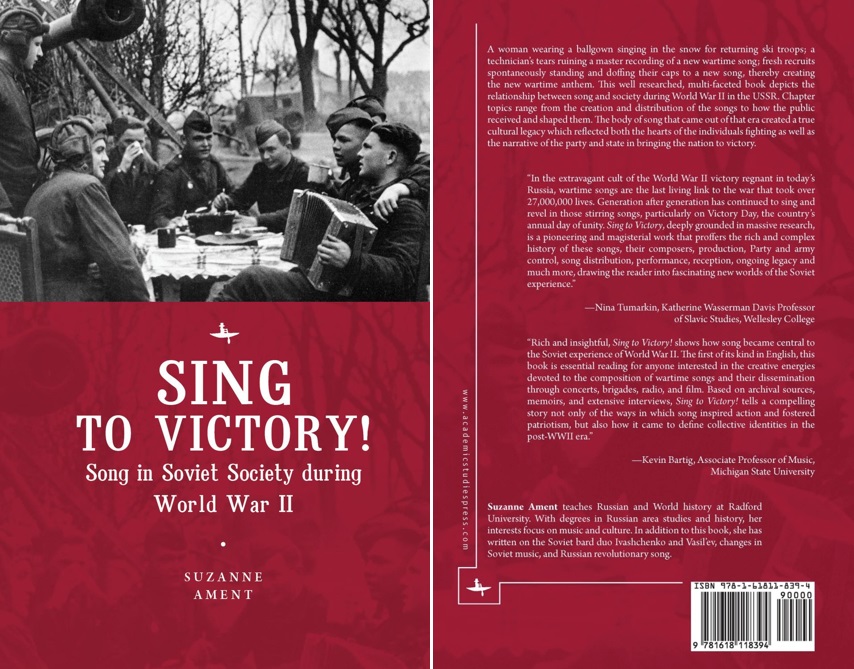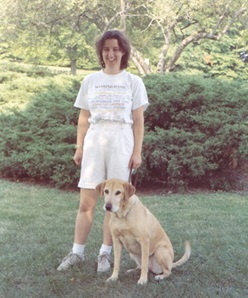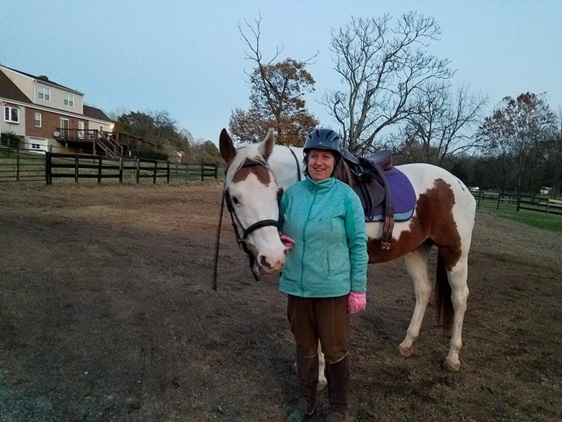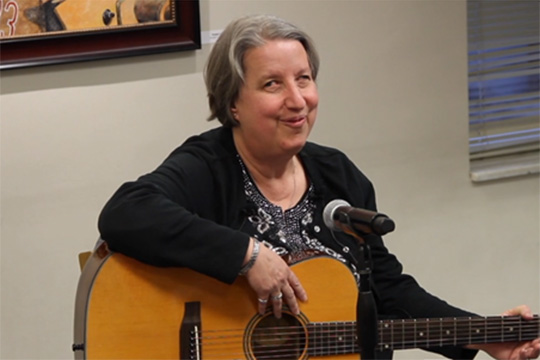Professor Suzanne Ament teaches the history of Russia at the Department of History, University of Radford (Virginia, USA). Whatever she tells her students about, she tries to include a piece of music in the lecture in order to create a “sound background of the era”. Sometimes she picks up a guitar and sings herself - old Russian romances, hiking songs of the Cossacks, bard hits and songs of the Great Patriotic War.
Suzanne has a magnificent silver voice, which I first heard back in 1991. That time she, a graduate student at Indiana University (Bloomington), came to Moscow to work on her thesis and participated in the television program “A Song Far and Close”, dedicated to songs of the war years. I remember how soulfully she sang “Dugout” and “Dark Night”. In the studio, the actor German Timofeevich Orlov talked to her, and I was the editor of this issue, since at that time I worked in the music department of the Main Office of Folk Art of Central Television.
Having met Suzanne Ament, listening to her beautiful Russian speech, I did not immediately realize that she did not see me. A congenital malformation of the optic nerve from her early childhood deprived her of sight. But God endowed her with absolute pitch, sensitivity, incredible love of life and strong will. Being blind, she was engaged in fencing in her youth and is still fond of horse riding. She visited many countries. Perfectly learned Russian, graduated from university, defended two dissertations!
In the year of the 75th anniversary of the end of World War II, teachers at the University of Radford organized a lecture course at the city public library for this anniversary. Professor Ament's lecture was the only one that directly related to Soviet topics and was called "The Role of Songs in Soviet Society during the Second World War". After listening to her, I recorded an interview with Suzanne Ament, which I offer the readers of our magazine.
– This year, the world celebrates 75 years of victory over fascism in World War II. How do you assess the role of the Soviet Union in this victory?
The role of Soviet Union was decisive to the victory in WwII over the Nazi invasion and thus over fascism as a whole. Among all the participants of WWII USSR was the one who lost the most number of lives in the battles and invasion, the war changed soviet life for decades with the demographic imbalance created by so many young men giving their lives. In addition, there was created an alliance, albeit a temporary one, between the US and the USSR which always leads to an opening to get beyond the later cold war negative sentiments. World War II was definitely a world war and affected everyone, but it is absolutely clear that all in the USSR were touched in multiple ways.

– You are the author of the book Sing to Victory, which was the result of your many years of research on Soviet song and its impact on society. Why did you as a historian become interested in the particular phenomenon of the song?
I always liked to sing and loved songs. When I first came to the USSR on a college study tour in 1978 year at age 17, we were travelling for 7 weeks over all Soviet Union: Central Russia, Siberia, Uzbekistan, Georgia and Ukraine. We even swam in the lake Baikal. Through our travels we had meetings with a lot of people in the different republics. And I noticed that music played a big and various role in their lives: some used it as protest against something, others used it to show their culture, still others showed patriotism, while many used songs as a bond with family and friends, rest and entertainment (this last category seemed much more ingrained than in the US, as we listen more than we sing). I had to write a paper about my impressions. And I emphasized the attitude of Soviet people to the song when I was writing about my
trip to the Soviet Union. So this was my first experience of a theoretical approach to the song, music and culture. As I went on in my studies I did a master’s thesis on the origin and creation of the Russian Revolutionary song. Then for a Ph.D., I began to research the WW II songs. I finished my dissertation on that theme and now have finished the book which extended that study and better organized my thoughts and conclusions.
– Do you have a favorite Russian song? In what life situations do you sing it?
Oh my, that is a tough one! I have several. Of the songs composed during the war I like “Zemlianka” and “Temnaia noch’” – they are so lyrical and evoke such strong images with their texts and stress humanity and love while acknowledging the hardships and suffering of war. I also love “Katiusha”, because it is one of the few songs that Americans heard during the cold war and we learned it in Russian class. Also it is so fun to play when others will sing, clap or even dance to it, as a group did outside of Samarkand in 1978. Russians Americans and Uzbeks all singing and sharing a beautiful sunny May day and “Katiusha” tied it all together. Another favorite is A. Dolsky’s Udivitel’nyi Val’s I did a semester study in Leningrad in 1981 and so have such a fondness for that song that we heard in our phonetics class. I also love the bard duo Ivashchenko and Vasil’ev and wrote an article about them.
I sing these for Russian and American audiences and sometimes for my classes. (I teach all aspects of Russian history)

Suzanne Ament with her dog Sparkle. 1991
– How did your interest in the Russian language and culture arise?
It is a very interesting story. For many reasons I finished my high school a year early and was planning to go to what we call Community college for a year before starting university. I had taken Spanish before and was planning to continue that. Also I was supposed to visit family friends in Peru. Well that summer trip didn’t work out and my mother said to me: “You cannot just sit at home and sulk”. She thought I should go take Spanish in the intensive summer language school at the university. I checked and Spanish group was all full. Russian had spaces. I had done a little bit in high school about Russia so said: “Why not?” and thus began my study, four hours of class every day and 8 hours of homework. I was just 17 and had never lived in a dorm before. And I loved it! Our professor who was Russian (she had married an American and left the USSR) she liked us to do what we enjoyed. I learned a song, another girl did poetry, one guy remembered sports terms for a monologue. We of course learned grammar and vocabulary too.
Then because I had done this summer intensive course (a year in 9 weeks) I ended up going straight to university to continue Russian. And then in that first year I was able to go on the study tour to the USSR. We spent 49 days in I think 10 different cities. It was amazing! And when I was there-one afternoon I was outside in Suzdal’, listening to the birds (probably, it was ravens) and suddenly this wave of feeling came over me. It was like I had come home! I have no Russian ancestors, my family didn’t know any Russians but somehow I was connected. I’ve always felt like that. When I suddenly hear someone speaking Russian I perk up. When I go to Russia I get excited and I’m always sad to leave and yet always grateful I got to be there.
Why is this? Well, I think this is somehow connected with the words of the Prophet Bahá'u'lláh, the founder of the Bahá'í faith, who said: “God has predetermined Russia such a role, with which nothing can compare ". At the time though I wasn’t even a Baha’i so it was all mysterious and mystical and I knew I wanted to know more about Russia, its people, and its music.
– How many times have you been to Russia and which trip left the most vivid impression?
I have been to the USSR/ Russia 8 different times: 1978, 1981, 1990-91, 1992, 1994, 1998, 2000, and 2008. Each trip was different the longest was in Moscow doing research for my dissertation. I also knew the Baha’i community in Moscow and as it turned out, that was the last year of the USSR. All the trips had something special: the first was our guide Svetlana. My backpack was stolen so I lost her address so never could write her again. She taught me some songs.
I hoped to get married two different times and although that never quite worked out-parts of my heart are there still. I got to meet many in the Baha’i community over the years and spent many hours talking, listening, singing, and taking in all kinds of Russian experiences.

– What do the “Russian soul” and the “American soul” have in common? What is the biggest difference between Russians and Americans?
This is not an easy answer to give. One thing that is the same is a kind of can-do spirit. It comes for different reasons though and thus makes it unique to both. Russians have this spirit from surviving hardships: the climate, the weather, famines, cruelties like the oprichnina, and being under the control of another (the tsar or the state) Americans get this from being a young nation which came onto a huge continent and decided to make it better than where they came from. This did not always work out but the pioneer spirit, “we can make it happen”, makes them push forward.
Perhaps the difference in this is that Russians can do without needs while Americans can’t do without needs so they try to satisfy them. And that leads to another difference.
America has been quite focused on the material: the bigger the better, “two cars are better than one, having things is very important. Russians – although of course they would like to be comfortable make do with what they have, will share readily with those they love and trust (A family lent me a thousand rubles to get out of Moscow to go home when my mother died in 1991). Of course, it was a loan but they didn’t think twice about it. Both are generous in their own ways: Russians love to share their frank thoughts and time with those whom they consider sincere and trustworthy. Americans share by giving money to causes, offering their services in times of disasters and in other ways.
For whatever reason, my soul resonates with the Russian way. But I noticed that Russians became more like Americans after the collapse of the USSR. In fact, I was a bit sad when I came back in Moscow in the 2000s and heard people having no time to meet, saw people stuck in traffic jams, and rushing hither and yon to get something done. Russia had truly melded with the west but perhaps in the not so positive ways.
Of course, when economics and other matters fall into the insecure zone for people, they don’t have time for the little things, but in losing those little things they lose much more.
Another thing I have always heard: Americans smile all the time and Russians do not. Since I am blind, I cannot judge this… but what I can say is that I feel like the Russians do smile-through their hearts.
– These days there is no escape from the theme of coronavirus. This misfortune has broken the habitual life in many countries. Why do you think God sent us this test?
In my experience with the Baha’I writings, tests are for our benefit. Thus we should go through hardships and come out more spiritual - that is turned towards our true natures Spiritual - not material -beings. So what can we say by this? The virus knows no boundaries: Anyone can get sick and it knows no borders. This again establishes the truth that we are one human family facing the same tests.
In order to pass this test what should we do? In my mind it is to remain unified. What does that mean? Don’t break off and only take care of your “own”. And it seems some like the scientists around the world are heeding this. Don’t limit your knowledge, resources, information, and help just to your own. It’s important for people – not to become just entities on some technological platform. Of course people must be cautious to slow the spread of infection but when people get crazy and hoard, or get panicked or think they can take advantage by price gouging or insider trading, then they are not being unified.
If we truly understood the nature of this life: preparation for the world beyond we would not be as panicked about dying either. That isn’t to say we should be complacent but not get to the point of ignoring the loneliness of someone, or their real needs just to keep yourself from getting ill. After all, 80% of all who get the virus recover well. If we truly act like one human family, I think we will overcome this test with “flying colors”.
The conversation was led by Aida SOBOLEVA
“In the dugout”. Music by Konstantin Listov, lyrics by Alexey Surkov (1:52)
“The Amazing Waltz”. Music and lyrics by Alexander Dolsky (2:20)
“Again I hear your voice”. Music by Fyodor Sokolov, verses by Afanasiy Fet (2:27)
“From a distance” (in English). Music and lyrics by Julia Gold (4:11)
“We are one” (in English). Dan Seals Music and Lyrics (3:59)
Prayer of Unity (in English). Music by Barbara Qualls to the text of Bahá'u'lláh (2:18)
read more in our Telegram-channel https://t.me/The_International_Affairs

 12:16 30.03.2020 •
12:16 30.03.2020 •























